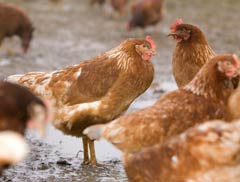Are organic eggs commercially viable?
Poultry was caught up in the crossfire between alternative approaches to the organic movement at the national producer conference held recently at Harper Adams University College.
Lawrence Woodward, director of the Organic Research Centre, Elm Farm, questioned whether there was a real place for commercially-produced eggs and poultry within the organic concept at all.
“I’ve always been of the belief that there are some things which should not be certified, because we can’t have a production system that actually meets our principles,” said Mr Woodward.
His remarks came during a debate on whether organic principles should come before commercial reality in organic production systems.
He was responding to a call from egg producer Gerald Osborne, who had called for the approval of synthetic methionine as an ingredient in organic rations.
 |
|---|
| It is hard for the poultry production system to follow organic principles. |
“If we have to change the whole production system we could be getting to a situation where eggs and poultry cost a lot more. And then you are just servicing the elite, and possibly having to produce eggs seasonally.”
Mr Woodward replied that it was possible that a small amount of amino acids could be used as stepping stones, but only after a real evaluation “of the kinds of production system in which you’re engaged, and what changes can be made”.
“What’s happened with the poultry industry is that we’ve started with a conventional system and tried to modify downwards,” he said. This was the opposite of most of the other organic livestock production systems, where they started with the principles and built up.
He claimed that when organic standards were first being drawn up in the UK, “there was no serious consideration of poultry standards, because all of us involved in developing standards thought it would be too difficult on anything other than small-scale – just technically too difficult because of problems such as, amino acids, welfare, large houses.”
“So, we didn’t develop standards, and there wasn’t a certified organic market for eggs and poultry in supermarkets.” Products could only be found at local markets from small-scale producers that operated within the principles,” he claimed.
“There was a drive, however, from one supermarket in particular, to get organic poultry products, particularly eggs, on supermarket shelves. And one of the sector bodies was commissioned to come up with some standards which essentially were modified conventional practice.
“Ever since, organic eggs and poultry have been driven solely by the market. We’ve had problems with poultry that we’ve never really dealt with, because right from the beginning we were dealing with a mistaken set of assumptions, in that you could scale down industrial systems.”
“We should recognise that there are some things that are too difficult to do, because it brings into disrepute those things that we can do well,” he concluded.
But earlier in the debate, organic farmer Rex Humphrey claimed there was a hidden agenda to rack up standards. “I hear it every day, let’s crank up the standards. Let’s more rigorously interpret the standards.”
“I am a practising farmer, as are most of you. We know how hard it is to make a living in organic farming today, and how hard the marketplace is getting. Organic food requires a 15-25% premium for producers to survive. In this climate, is it sensible to be discussing measures that increase costs?” he asked.
“I do no want to see any relaxing of the present standards,” he emphasised.
“The term ‘sustainable’ is frequently applied to the organic sector, but no system of farming is sustainable unless it is profitable. Otherwise it becomes just a rich man’s hobby. If we are producing food so expensive it can only be afforded by the well-heeled, there is no honour in that either.”
There were people who took exception to the term organic ‘industry’. But if the sector was to feed a growing proportion of the population, it required a properly structured industry, he maintained.
“I am passionate about organic food, but we have 10 families living off our six linked farms, and a wage bill of £240,000 a year. We have to recognise basic business principles.”
Others disagreed: “If you keep to principles, you get the best results. It is not the case that principled standards are going to lower profitability,” said one delegate.
However, earlier in the conference Richard Jacobs, of certification body Organic Farmers and Growers, reported that profitability was already under pressure from the lack of affordable organic cereals. He called for better links between growers and users to maximise the returns that were available to both parties.
“We have already seen a lot of poultry producers pull out. We now have a large number of organic livestock farmers who are either going to pull out of the system or fail to make a profit. People are saying to us, ‘if this goes on much longer we can’t carry on’.”
